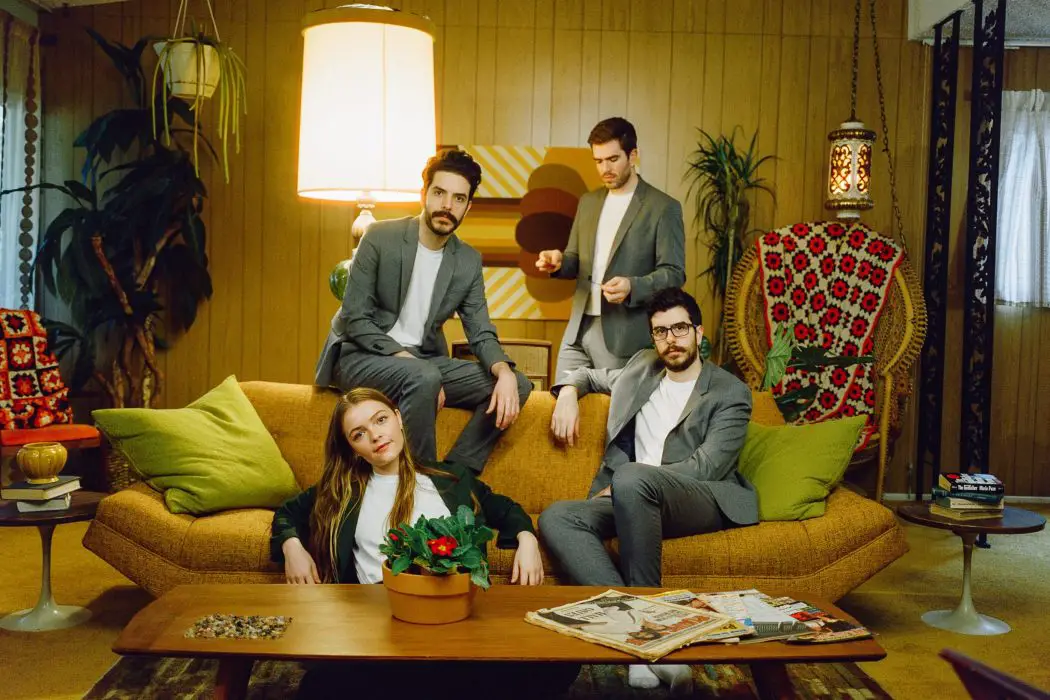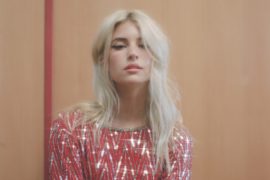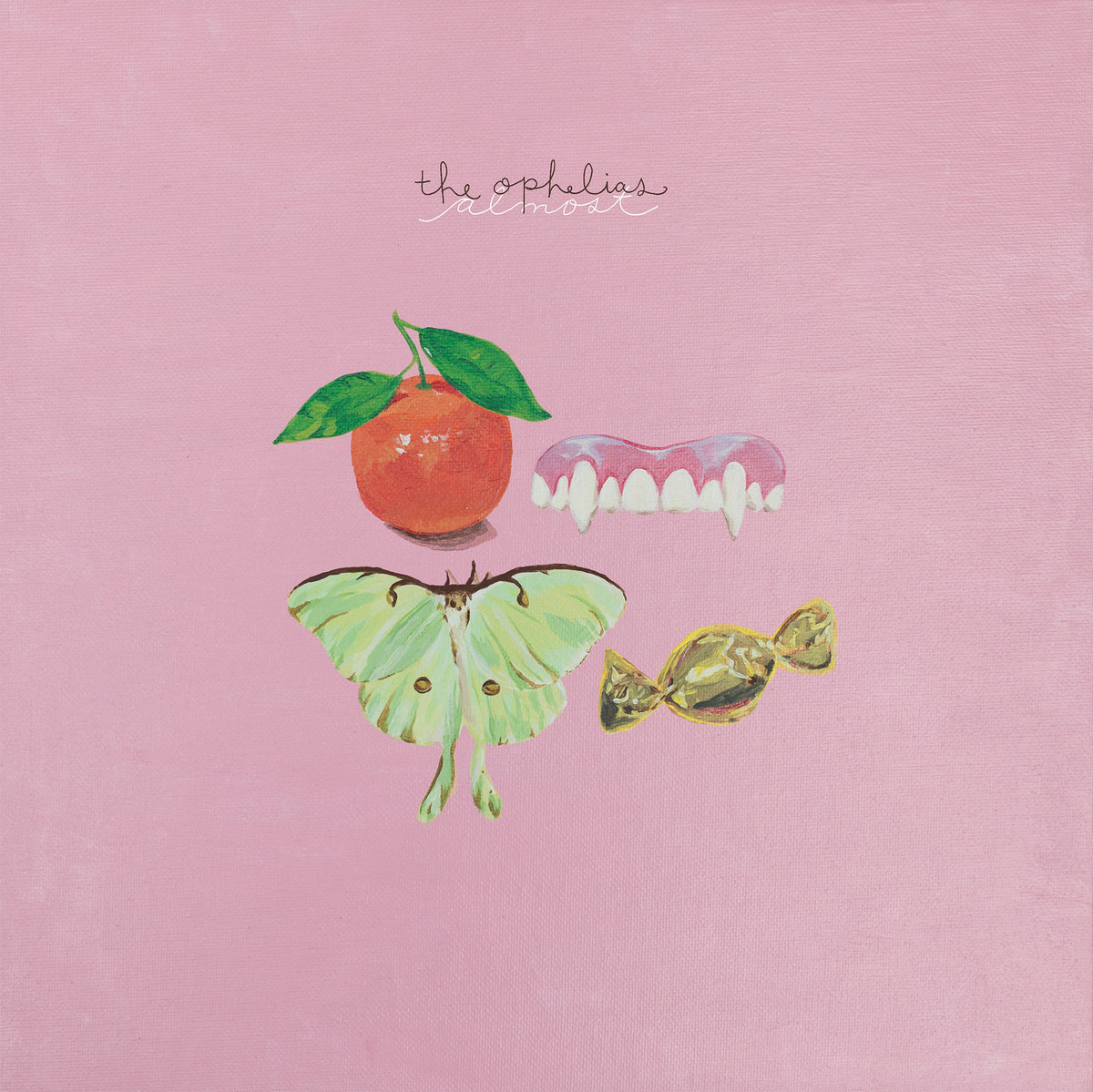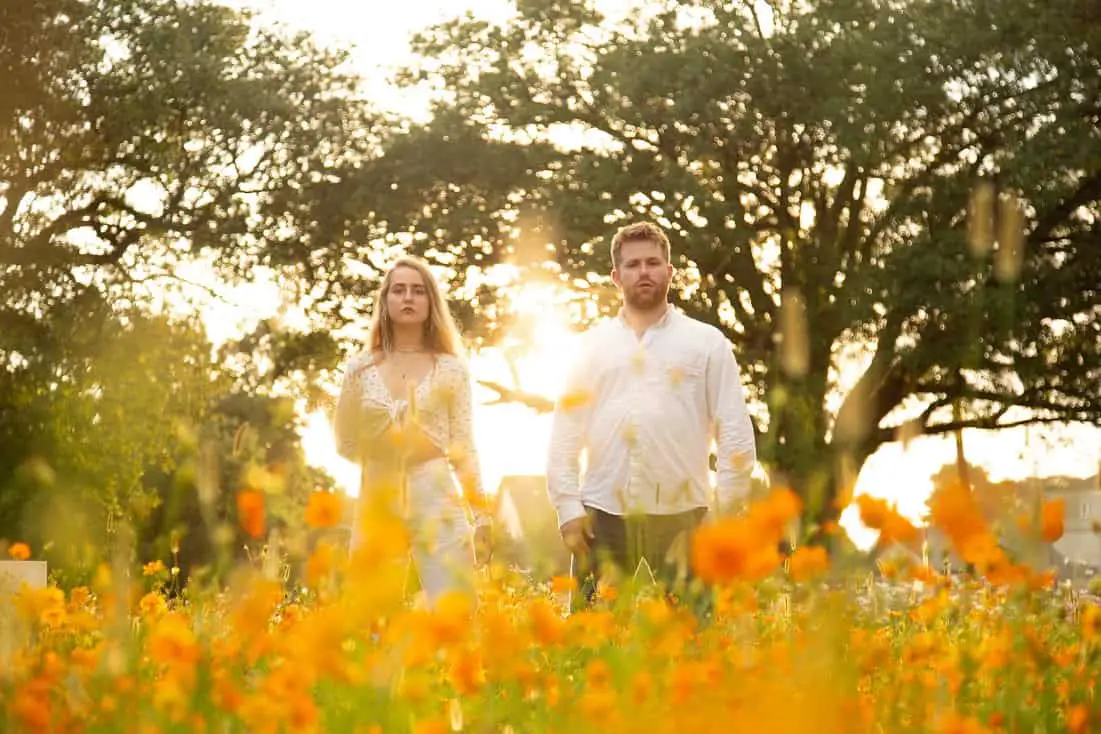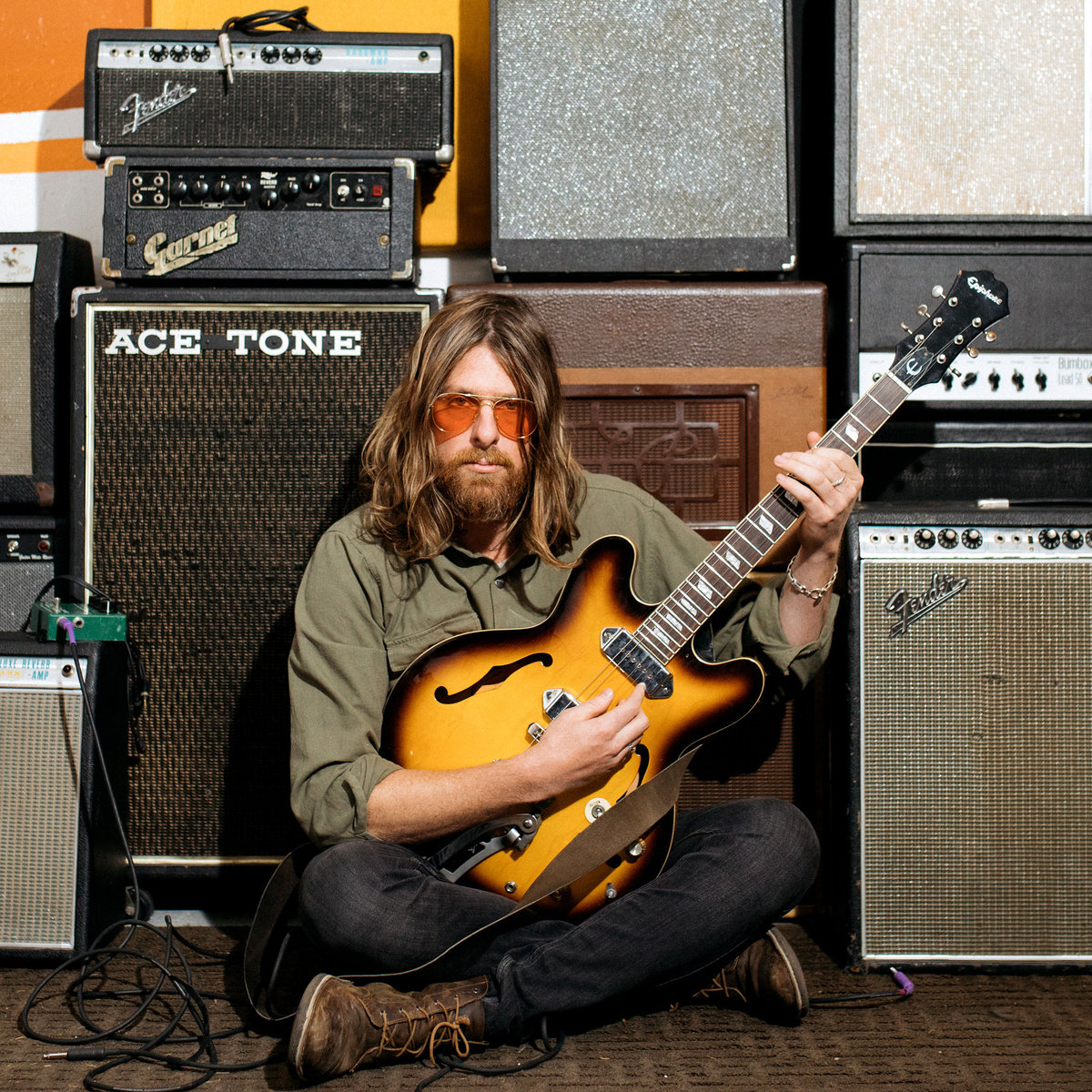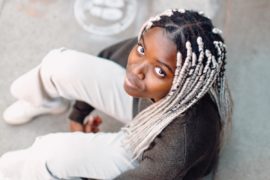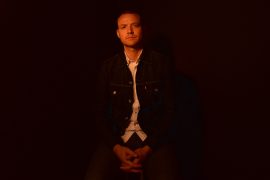Atwood talks to Dizzy’s Katie Munshaw about the journey from Baby Teeth to The Sun and Her Scorch, the story behind the making of The Sun and Her Scorch, and the pros and cons of releasing an album during quarantine.
— —
The cover of Dizzy’s debut album, Baby Teeth, shows four people in the middle of a suburban neighbourhood street, backs turned, floating away into the early night sky. The people depicted were band members Katie Munshaw, and Charlie, Alex, and Mackenzie Spencer and in a way their debut tells the story of them saying goodbye to suburbia and adolescence. The album’s sounds, leaning towards a more electronic and dreamy soundscape, are full of hope, idealism, and nostalgia, and the story of going through your first real heartbreak is scattered throughout Baby Teeth’s eleven songs.
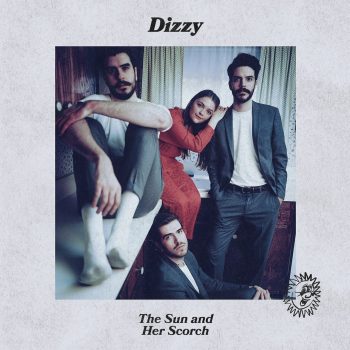
After touring extensively and winning the Juno Award for Best Alternative Album, Dizzy took a breath. It was time to make their second album, and following the success of “Joshua” and “Backstroke” there was a dangerous temptation to write about failed romances again – but centring another album around the vibrant experience of being a teenager wouldn’t feel right or real. The band also decided to self-produce their album for the first time. They were starting over and doing everything anew, so Munshaw and the Spencer brothers retired to a cottage in Canada to write.
Dizzy re-discovered themselves as a band: production went from extremely electronic to constantly experimenting with live instrumentation, while Munshaw dug deep into herself to find out what themes would drive the album. “I had to figure out all the other ways that a heart can break, and if I’m not romantically getting my heart broken, why am I still feeling like shit?” Munshaw tells Atwood Magazine about writing the record. The result is a vibrant, warm, and hopeful album brimming with cinematic soundscapes and self-reflective lyrics that examine the less-than-pretty facets of our existence.
The Sun and Her Scorch represents Dizzy in their essence, opening up about the harsher realities of adulthood, crafting their own sound from start to finish, using music as a way to find out what they’re capable of, detect what they’re feeling and how to deal with that. On the album cover, all band members are facing the camera directly with almost nothing else to look at. They’re face-to-face with their listener saying “This is us in our entirety, all the best and worst parts of us, there’s not much else to it”. It’s a beautiful body of work that presents Dizzy as more confident, bold, and satisfied than ever before.
Atwood re-connected with Dizzy’s frontwoman and songwriter Katie Munshaw to talk about the journey from Baby Teeth to The Sun and Her Scorch, the story behind the album’s themes and images, and the pros and cons of releasing an album during moment of quarantine.
Listen: The Sun and Her Scorch – Dizzy
A Conversation with Dizzy
Atwood Magazine: Hi Katie! How are you?
Katie Munshaw: Yeah. So in Canada things are starting to sort of go back to some semblance of normalcy, but it’s still really weird. It’s about to be mandatory that people wear masks and people are being ridiculous about it, getting up in arms about it. It’s very, very silly.
Yeah, that happens here as well, it’s horrible. How have you been coping during quarantine? It must be such a change of pace for you, you were in the middle of a tour and then everything happened.
Katie Munshaw: I mean, I wasn’t really coping In the beginning I wasn’t doing amazing. But now I think I’m starting to get into a bit of a rhythm, I’m keeping myself busy and trying to write again and spend time with my family and exercise. I don’t know, try and keep some normalcy going.
I don’t know how your routine normally works but it must be hard for you to establish a routine during quarantine, it's already hard for everyone as it is.
Katie Munshaw: Yeah I mean especially being in a band, like you write your record and then you’re so ready to go on tour. We had just finished the record the new record at the top of March, like literally the day before we were supposed to go on tour. We did go on tour and when it got canceled we came home and were like, “Well we don’t feel like writing and we can’t tour, like, where do I put my body?” So that was weird to figure out but here we are.
I just wanted to say, congrats on the record. It’s so bold and confident. It really shows you blossom into such a beautiful band, I love it.
Katie Munshaw: Thank you, thank you.
It is very different from Baby Teeth and even different from “Twist” and “Heavy”, that came in between both albums. What happened after the end of Baby Teeth that ended up fuelling the making of The Sun and Her Scorch?
Katie Munshaw: We wrote Baby Teeth so long ago, I was 20, 21 when a lot of the songs were written so I was pretty fresh out of high school and I think you can hear that in the lyrics. I think we were really young as a band, we weren’t confident enough to do a little more producing on our own and that led to working with Damian Taylor, who was wonderful and is why Baby Teeth sounds in large part the way it does. But I think with The Sun and her Scorch, obviously I’ve just grown up and I’m talking about different themes in my music. I mean, I’m not talking about the guy who broke my heart in high school anymore, obviously. There are different things that I’m going through, it feels like being in your 20s is like a whole new like puberty that nobody really talks about. So, I’m just navigating that. Then sonically I think we decided early on, after “Heavy” and “Twist” we were like “We’ve proved that we can produce on our own and it turns out okay”. I think we just gained a lot of confidence and started listening to different things, and that sort of shaped what The Sun and Her Scorch sounds like.
Watch: “Twist” – Dizzy
“Twist” and “Heavy” came between album one and album two, and they can be seen as a bridge, sonically, between Baby Teeth and The Sun and Her Scorch. But I can also imagine that they opened a lot of doors for you, like you just said, production-wise and stuff. Was The Sun and Her Scorch already something you were thinking about and writing when you released these two songs?
Katie Munshaw: No. Those were just two songs that we really liked, and we knew that we were going to be touring for a little while longer, but we had these two songs and we just felt like they weren’t a part of an album, so we just decided to put them out. I think, if anything, they helped with our confidence and in the confidence of our label and our team to just allow us to produce on our own for this whole second record, sort of like a calling card like “Hey we can do it and we’re not going to fuck it up too bad” (laughs).
When did the decision to produce the album yourselves come about?
Katie Munshaw: Well on Baby Teeth, Charlie our drummer does a lot on the production side of stuff on as well. I think he didn’t know enough then, and I think he learned a lot and we learned a lot between Baby Teeth and Heavy and Twist. We just sort of went for it, I don’t know it’s just sort of a creative decision where like, do we want to have somebody else in the room, if we can do it ourselves? And we decided no.
And did having no one else in the room affect the writing process or the process of making the album at all? Did that help you gain more confidence to experiment or change up the sounds that you were using?
Katie Munshaw: I think we were just doing things that we liked the sound of. This record has a lot more live instruments in it, there’s violins, drums, piano, and acoustic guitar. It wasn’t something that we were like “Oh we need to be different this time”, it’s just like, “Oh I love this song and they use acoustic guitar, what would that sound like with our lyrics and our stories, and how would these different sounds elevate the emotion or the story we’re trying to tell?” It just happened pretty naturally.
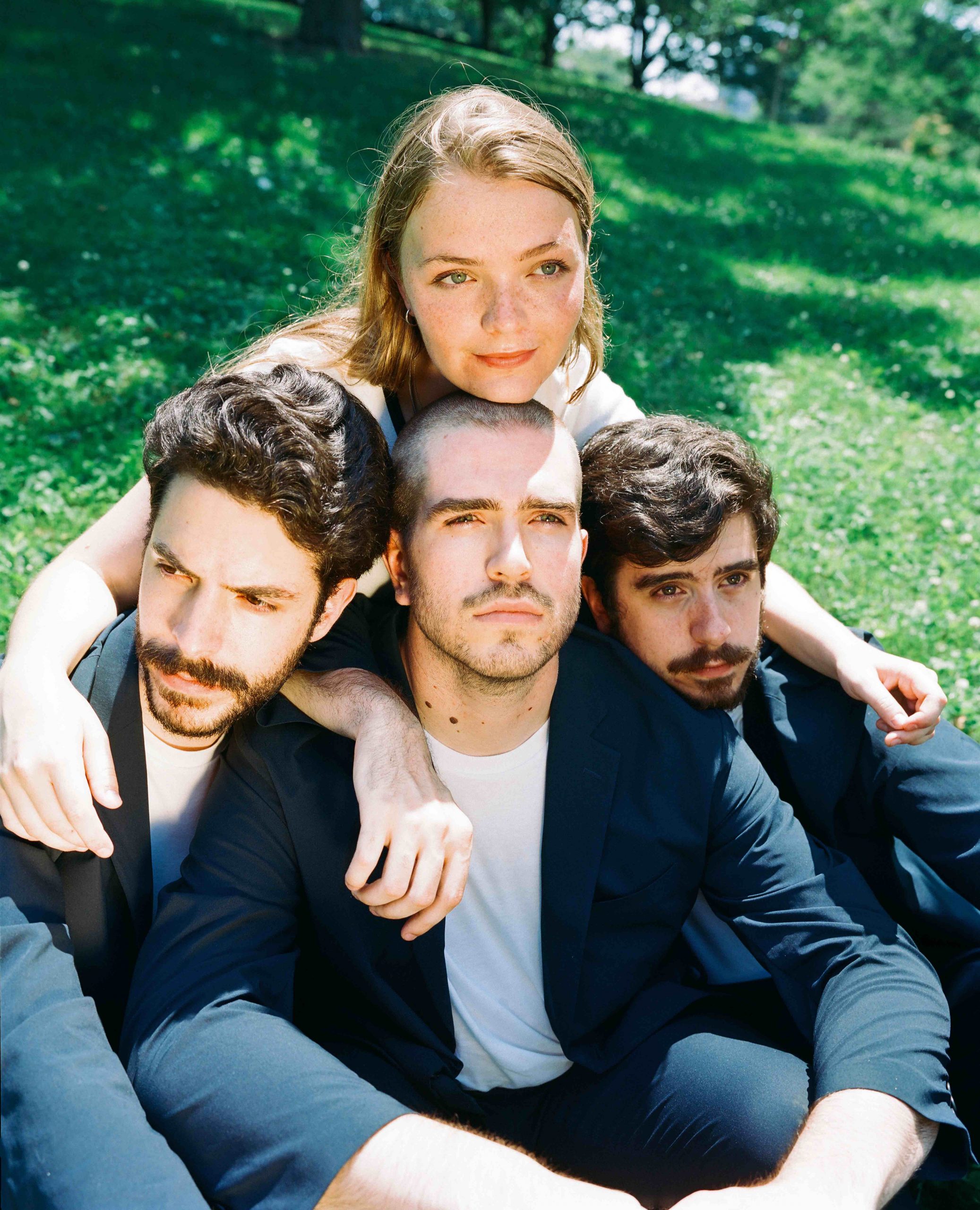
The Sun and Her Scorch sounds a lot warmer and brighter, even though at times the lyrics are about more serious topics like the loss of a friend, and they really make you think. There are also moments in there when you just want to get up and dance. There’s a lot of balancing between the harsher realities in the lyrics with the warmer sounds on this album, whereas on Baby Teeth the lyrics were warmer but the sonic palette was cooler.
Katie Munshaw: I think for Baby Teeth, like I said earlier, I was really just in the headspace of like romantic heartbreak. I feel like when you’re young that’s all you can really see, like having your heart broken by the guy that you were obsessed with in high school or stuff like that – things that seem really petty to me now. I think when I went to write the second record, I was trying to write those songs again because a lot of those songs were the most successful on Baby Teeth, a lot of people’s favourites are “Joshua” and “Backstroke” which are classic heartbreak songs. And I realised that I wasn’t going through that anymore, I’m not going through that, luckily. But then I’m like “Well, what do you write about, if it’s not for love?” because I think a lot of music that I listened to growing up, I mean, Taylor Swift was my Holy Grail gal and all of her songs are about heartbreak. So then I had to figure out all the other ways that a heart can break, and if I’m not romantically getting my heart broken, why am I still feeling like shit? And then that opens a whole other world up, which is so helpful and it’s something that I haven’t really navigated at all. I think that just came from growing up and being in my 20s now and realising there’s a whole other world of issues that I’m gonna have to deal with.
And between you having your heart broken in all these different ways in the lyrics there are these poppy, happy melodies, it feels like you’re dealing with opposite energies in a way. Was it a conscious decision in any way to make songs that people could dance and cry to, or to bring such warmth to an album that could be so cold if people only read the lyrics?
Katie Munshaw: I don’t think it was conscious. I think that even the most sad songs we have, there’s an element of hope, and maybe that is the warmth that you’re feeling, or maybe that’s where we drew from when we wanted the songs to sound a little brighter, is just to have that element of hope in each song.
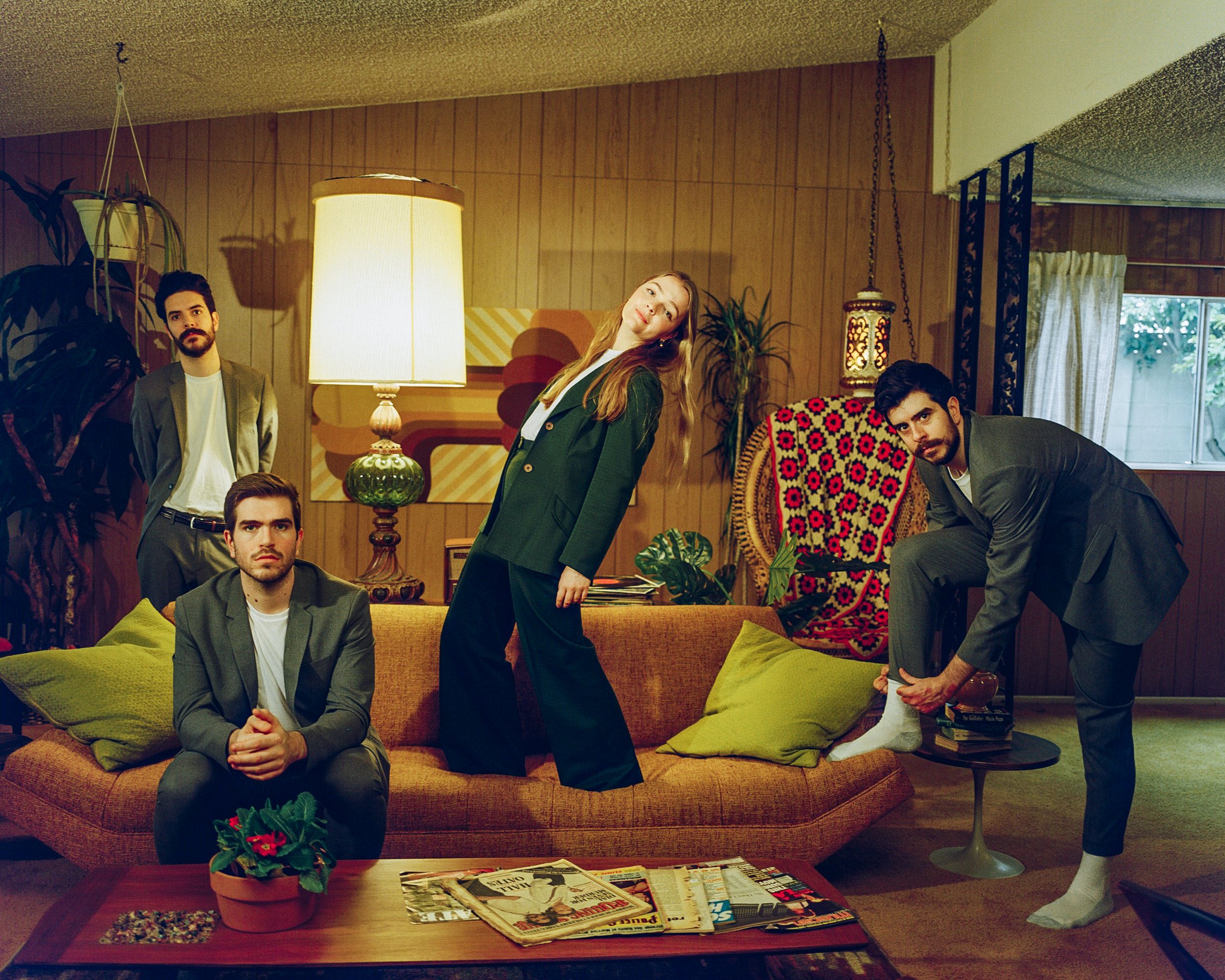
I read that you rented a little cabin and were there for a while just to write the songs. When you were there, what was the moment when you realised that you were making the album and what it was going shaping up to be like?
Katie Munshaw: That was the most helpful week ever. We were feeling like it was a bit daunting to make a whole other record and we just got together for a whole week, everybody brought their own ideas, and we wrote almost half the record there. We wrote “Lefty”, “Roman Candles”, “Ten”, and a bit of “Sunflower”. And I think it was “Roman Candles” or “Ten”, the same day we wrote those two songs, and I think we were like “Okay this is a different feeling, maybe this is what this record is about and it’s not just about what Baby Teeth was about, it is its own thing now, It’s its own monster that we have to figure out”.
How did you feel exposing the less-than-pretty side of yourself in the music - why did you feel that this was the right time to be so candid about your own feelings about yourself, the way you approach life and your grief and all this stuff?
Katie Munshaw: It was the same moment where I was like “Okay I’m not writing about love anymore, what do I need to write about?” and when I realised that I had to do some internal figuring out. I think that was just the moment there where I was like “Okay I gotta write about how I am jealous of my friends or I don’t deal with grief well or I’m mean to my partner sometimes, things like that”. I think I just realised “Okay, we’ve got to figure this out”. It’s like a little therapy session in my old brain.
Was it daunting for you to go there?
Katie Munshaw: I think it’s weird listening back with other people, because I think I’ve made it very clear who all the songs are about. They’re very much about me.
When you bring the lyrics to Mackenzie, Charlie, and Alex, how do the conversations go? Do you explain what you’re writing about even if it’s not the happiest theme or moment?
Katie Munshaw: I don’t actually ever discuss it nobody ever really asked me. I think it’s just out of respect, or they know that I’ll tell them if I feel like they need to know something. They usually figure out what the song is about when the press release comes out (laughs), which is sometimes kind of funny. We’re close enough that they know all my secrets already and I’m sure they could guess what each song is about, they don’t really need a play-by-play.
The song titles in your albums are always made up of people, places, objects - on Baby Teeth there are “Bleachers”, “Joshua”, “Stars and Moons”, on The Sun and Her Scorch you have “Beatrice”, “Primrose Hill”, “Worms”, “Roman Candles”. Your tracklist to me feels like a quilt made up of all these different peoples and places and things. How do you pick these images that are going to make up the mosaic of the album?
Katie Munshaw: I think that my writing is really random in ways that I just get weird lines here and there, and sometimes they’re accompanied by symbols. So like, “Sunflower, are you even really in there?” that lyric, I never would have probably sat down and wrote that, but when I started humming the melody it just kind of came. And then it ended up being a symbol for myself and being tender with yourself. I don’t know those things, I don’t even think about them, they just sort of come, which is lucky, and I wish I had a better answer. I don’t know where it comes from, there’s just some weird space that my brain pulls out of.
But I’ve also seen you talk about how particular you are with words that you use in your lyrics. So after they’ve come out of you do you take time to analyse them or re-structure them or do you just take that impulse and run with it?
Katie Munshaw: I think with Baby Teeth I was really hard on myself. I think on The Sun and Her Scorch I started to ease up on myself. “Sunflower” was a pain in the ass to write, I think I probably spent like 40 hours just sitting over my laptop in tears, probably (laughs). But with other songs like “Ten” and “Roman Candles”, those ones were so easy and joyful to write because they just slipped out of me and I was like “This is what it is, I’m not gonna revise and criticise, it is what it is”.
Watch: “The Magician” – Dizzy
This album is bookended by “Worms” and “Worms II”. I wanted to know, other than why use the image of worms, how do these songs compare, what are you trying to track in terms of the album’s journey when you start and you end the album in very similar ways?
Katie Munshaw: So the idea for “Worms”: initially it was a demo that Charlie had and immediately I put over that sort of meditative mantra of what you hear the lyrics, they’re just really repetitive. I remember it was very early on when we were writing the record and I was trying to figure out what all of these feelings that I was having for each song were, what I could umbrella them under, what category they would fall under feelings-wise, and I settled on this feeling of being underground and feeling trapped underground and not knowing how to get out of there, so that that’s where worms came from, just being underground. The idea of opening with that track, I really wanted it to be this hand reaching from the ground to the listener, and if the listener grabs a hold then they’re taken under into this world of The Sun and Her Scorch. We were really meticulous about what was the first thing you hear from each voice and instrument because it felt like a big deal to us to step back into releasing music and it was this “Hello again, here we are and we’re about to go down underneath and there’s gonna be some gritty stuff under there and let’s do this together”. And then ending on the song, I think it just felt a little bit like a goodbye to that world, as sort of like end credits to a film.
You talked about how the world that you entered for this album is sometimes ugly, sometimes hard, and you mentioned the feeling of being trapped and suffocated. Do you feel that by the end of this process the wounds have healed and you've managed to get out from underground?
Katie Munshaw: I feel like it’s so not linear, even just being human. I think I’ve tackled a lot of demons, I think that I’m definitely working on a lot of things, but I’m sure I’ll slip back into some things. I think what has been most helpful about this whole record was that now that all of those emotions are out there and I have them all on the wall and they’re, under their song titles I can feel myself slipping into certain songs sometimes, like certain emotions from certain songs might rope me back in like “No, no, no we’ve been there, we wrote a song about it, we know we’re supposed to act” (laughs). And I think in a weird way, it has been really cathartic and educational for myself.
Did you have the same experience with Baby Teeth, trying to dissect your emotions and then seeing yourself slipping back into songs?
Katie Munshaw: I don’t think so. I feel like because that record came out so long after it was done, after it was written, I felt so detached from it.
Watch: “Sunflower” – Dizzy
You mentioned how meticulous you were with the first sound that you’d hear from everybody in the band as your new hello, and how tense that moment was for all of you. Why did you decide “Sunflower” was officially going to be your new hello as a band?
Katie Munshaw: I think that to me that song is like a sister to “Worms”. It’s recognising that feeling of being underground. And it’s so silly but it’s actually sort of speaking to a seed in the ground almost, like “You’re in there, you’re gonna come out soon and everybody’s waiting on you, and everybody loves you”. That song is just so tender to me that I think it really was just a good base to start with.
On the liner notes video for “Sunflower” you talked a little bit about how all of you felt knowing that you were going to write a record already having a platform and fanbase, and how maybe that was a little bit of a weight at the start for the band. Can you talk to me a little bit more about like negotiating other people's expectations with the process of making your album?
Katie Munshaw: It didn’t weigh on me for very long, we’re not big time yet (laughs). I just hope the same people that liked us will like it and I hope that they join us in this new phase, but it wasn’t a huge pressure on my mind. I think the biggest pressure I felt was at the beginning when I was trying to write another “Joshua”, or another “Backstroke”. And then I realised it’s okay not to write about those things anymore.
I've read that “Ten” has a really special place in your heart. Can you talk to me about the song, why it’s so personal to you and why it essentially closes the album?
Katie Munshaw: That song was written at the cottage. It was written because I remember I was looking in the mirror one day and I realised that my eyes are starting to change, I’m starting to get wrinkles around my eyes because I’m getting older. And it freaked me out, it just totally freaked me out, and I was just thinking about like growing older somebody and how you have to say goodbye to that person, that’s just not something that you think about a lot, and it was terrifying. You die alone, and I think that was just something that freaked me out, and that’s what that song is about. It was so, so emotional to write but it was so joyful. There’s this video of me at the cottage, and everybody was so tired because we had written “Roman Candles” that day, everybody just wanted to go to bed and I was like, “Can we please just work on this idea that I have?”, and there’s a video of me dancing around the cottage probably five glasses of wine in, ordering everybody what to do and what felt like a verse, what felt like a chorus. It was just a really pleasant way to write a song. I hope because it’s at the end of the record it doesn’t get skipped over because I think it’s the one I’m most proud of lyrically and I think I see a lot of growth in my lyrics.
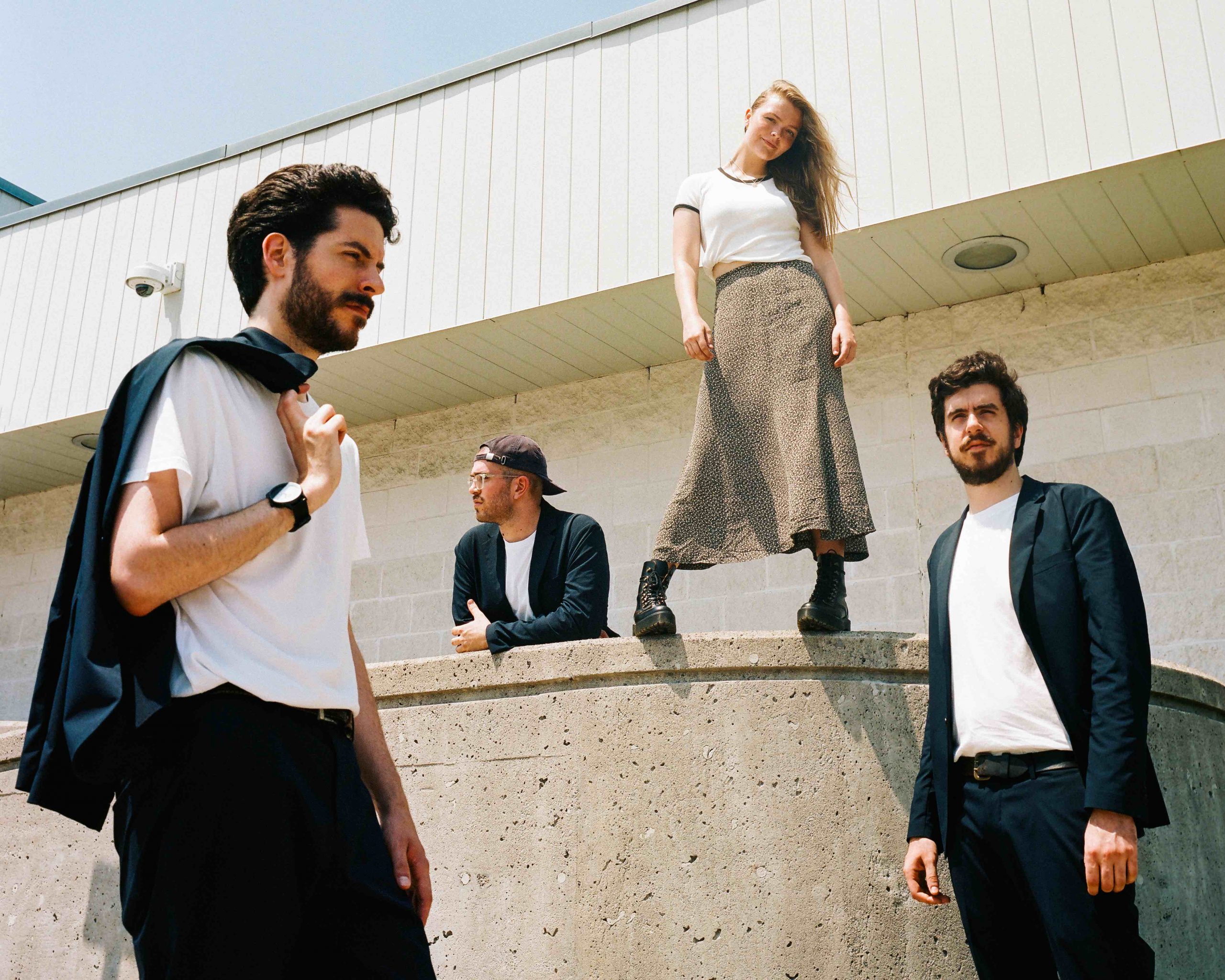
How do you feel, not only releasing music during this time when everything seems a little bit paralysed, but how do you think people's reception to the album will be now that they have to process it by themselves before they get to enjoy it with a crowd and people at a show?
Katie Munshaw: I would hope that maybe it’ll give people time to sit with the songs and connect with songs that they wouldn’t have connected to first if they heard it at a show. I think sometimes when you have are at a show and you hear a slower song it’s a good moment to tap out mentally and think about all the things you have to do after the show, stuff like that. So maybe if somebody stumbles across the album it’ll give them a good chance to stay with it for longer, I would hope that. Maybe this is what we need, okay? (laughs) Maybe people will find the record and we’ll just play even bigger shows next year (laughs) Hopefully, that’s best case scenario. Worst case scenario is it gets buried, but that’s okay too.
It’s complicated trying to understand what to do in the moment like this, but I do feel like albums like yours, and Phoebe Bridgers’ as well are great for a moment like this.
Katie Munshaw: Can we just talk about that? Please. That record. Nicole. It is so good.
I feel like her album is the perfect quarantine/self-isolation album because you can just bask in those feelings and give yourself the time to prepare yourself mentally, then listen to it, then snap out of it.
Katie Munshaw: She really just does this thing where when you listen to it you feel like “Oh, this record is for me, it’s all about what I’m going through”. Somebody the other day posted that they loved it, I was like “Oh, you don’t get it like I get it” (laughs). She does this thing where you feel like, so like attached to it. It’s so good.
We need a Dizzy and Phoebe Bridgers tour.
Katie Munshaw: Stop. Yes. Totally.
Watch: “Roman Candles” – Dizzy
You made two videos during self-isolation/quarantine, for “Roman Candles” and “The Magician”. I know that you had to change the idea for “The Magician”, which you had planned to shoot at the end of your UK tour. What was it like to take on this challenge to make two videos in such a possibly limiting way?
Katie Munshaw: “Roman Candles” had to be done socially-distanced so we couldn’t have the guys in it, which was pretty heartbreaking, because obviously after “The Magician” that sucked but it’s all good. I think that it actually worked out quite well because “Roman Candles” is so much about me going out on a limb and following my dreams and all that corny stuff, and also being brave, that whole song about that. I think that video, doing it by myself and learning choreography for the first time in my life and doing something new felt like it mirrored the song really well. I think the setting being me at a motel by myself, feeling alone at a motel just, again, mirrors being on the road and feeling alone. I thought that “Roman Candles”, oddly worked out symbolically really well for that song.
If you could sum up The Sun and Her Scorch with one lyric, what would it be?
Katie Munshaw: Oh god, I have no idea. (pause) Okay, I think the lyric would be from “Roman Candles”, the second verse: “Where do I put it this all down? I carry it high in my chest, tastes like blood in the mouth”.
— —
Connect with Dizzy on
Facebook, Instagram, Twitter
Discover new music on Atwood Magazine
? © Pooneh Ghana

